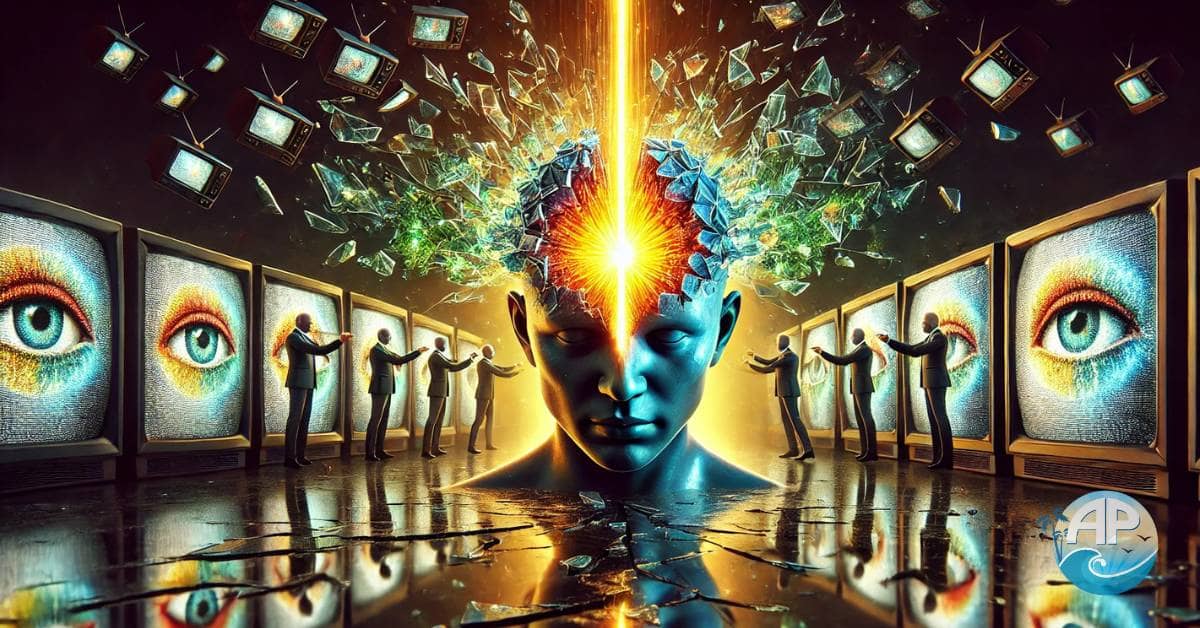Truth causes cognitive dissonance: here’s why your brain rebels before it finally breaks free.
Truth causes cognitive dissonance, and that’s exactly why it can feel so jarring at first. But that tension? It’s a doorway to awareness, growth, and personal freedom.
Curious about where this is headed? Here’s a quick snapshot of what we’ll dive into:
Table of Contents
- The Wake-Up Call
- What Is Cognitive Dissonance?
- Why Truth Feels Uncomfortable
- Handle Truth-Induced Dissonance
- Common Truth Bombs
- How Ego Reacts to the Truth
- Myths About Dissonance
- Tools to Navigate the Shift
- Final Thoughts & Empowerment
The Wake-Up Call You Didn’t Expect
Truth causes cognitive dissonance. It shakes your foundation, pokes holes in your beliefs, and makes your stomach drop. Ever felt that awkward, squirmy feeling when something just doesn’t add up—but everyone else seems fine with it?
That’s not you going crazy. That’s your brain confronting something big. And it’s normal. In fact, it’s a sign you’re waking up.
You’re not alone. Every day, thousands of people realize that much of what they’ve been told simply doesn’t hold up to scrutiny. And when that realization sets in? It often starts with a gut feeling, a glitch in the narrative, or a quiet whisper in your soul that says, “Something’s not right.”
This post will unpack what cognitive dissonance really is, why it hits so hard when you start seeking truth, and how to navigate that inner storm with clarity, curiosity, and courage.
Get ready to connect dots, shift perspective, and maybe even laugh at the absurdity of it all. Because waking up might feel jarring—but it’s also one of the most liberating things you can do.
What Is Cognitive Dissonance?
Let’s break it down simply.
Cognitive dissonance happens when your mind holds two or more conflicting beliefs, ideas, or values.
Example:
- You believe you’re free.
- Then you realize you’re being monitored, manipulated, and marketed to 24/7.
- Boom. Dissonance.
That inner discomfort you feel? It’s your brain clashing with itself. New information threatens what you thought was true. Suddenly, your thoughts start spinning. Identity gets shaky. Your nervous system kicks into defense mode: denial, avoidance, rationalization.
Contradiction is hard to process. Your mind craves a tidy narrative, where everything fits neatly and nothing needs questioning. So when something challenges that view, your inner alarm bells ring. Harmony is disturbed. Control feels lost.
And yet, paradoxically, growth lives in that disruption. Real, soul-deep, life-changing growth?
It lives in that messy space between the stories you were told and the truths you uncover.
And when truth causes cognitive dissonance, your ego might panic. But your higher self? It’s cheering you on.
Why Truth Causes Cognitive Dissonance
Waking up is messy. Here’s why it feels so emotionally intense:
1. Truth Threatens Identity
If you’ve spent decades believing something—whether it’s about health, politics, education, religion, history, or freedom—having that belief challenged can feel like an attack.
- “But I always thought…”
- “Everyone else believes this…”
- “That can’t be true… can it?”
When truth crashes into deeply ingrained stories, your ego clings tightly to the familiar. It tries to protect your self-image, your social standing, your sense of safety.
But here’s the kicker: The very identity you’re clinging to may have been manufactured to keep you docile, compliant, and small.
2. Truth Disrupts Comfort
Ignorance may not be bliss, but it’s definitely easier.
Facing the truth means facing the uncomfortable. It means admitting we were wrong. It means realizing our trust was misplaced.
And the consequences? They ripple through everything:
- Your relationships
- Your routines
- Your worldview
Truth demands that you change—but change requires effort. And effort is uncomfortable.
3. Truth Reveals the Lies We Bought Into
This one stings the most.
It’s tough realizing that some of the things we defended, promoted, or even enforced were built on illusion. Whether it’s the pharmaceutical industry, the education system, the financial game, or government narratives, seeing through the fog requires humility.
It can feel like betrayal.
- Betrayal by systems
- Betrayal by authority
- Betrayal by our former selves
Yet, on the other side of that pain is a fierce clarity.
4. Truth Demands Responsibility
When you know better, you can’t unknow it. Truth forces you to act differently—to live with more integrity, more awareness, and more intention.
And that level of personal accountability? It’s rare. Most would rather stay comfortably numb.
But you’re not most people.
5. Truth Challenges Groupthink
We’re tribal creatures. We want to fit in. We crave belonging. But truth often isolates us.
When you start seeing through the matrix, you may feel alone. Misunderstood. Even ridiculed.
But the more you honor your inner knowing, the more you’ll attract others doing the same. You’ll discover that real community isn’t about fitting in. It’s about waking up together.
How to Handle Truth-Induced Cognitive Dissonance
You can either:
- Numb out
- Double down
- Or lean in
Here’s how to lean in without losing your mind:
1. Pause and Breathe
Your nervous system just got overloaded. Before reacting emotionally, stop. Take a breath. Let it land.
Discomfort is not a signal to retreat. It’s a sign of growth. Sit with it.
2. Ask Better Questions
Truth causes cognitive dissonance because it requires a new level of awareness. But instead of reacting, get curious:
- Who benefits from this lie?
- What other explanations could be true?
- Does this information feel manipulative or liberating?
- What does my gut say?
3. Accept That Discomfort Is a Portal
Growth never feels like a warm bath. It feels like stretching muscles you didn’t know you had.
Dissonance is a signal that your mind is rewiring. You’re shifting from conditioned patterns to conscious awareness.
4. Laugh at the Absurdity
Some of the things we once believed were truly absurd. And once you see it, you can’t unsee it.
Laughter is healing. It helps process grief, shame, and shock. So go ahead and laugh at how ridiculous the illusion was. It’s part of letting go.
5. Find Your Tribe
You’re not the only one waking up. Look for people who question, observe, and think critically. Seek out those who do their own research and aren’t afraid to challenge the status quo.
Truth causes cognitive dissonance, but community creates stability.
6. Take Micro-Actions Toward Sovereignty
Small daily choices are powerful:
- Grow your own food
- Ditch toxic media
- Use cash over credit
- Say no when it matters
Each act chips away at the programming and rebuilds your freedom.
Common Truth Bombs That Cause Dissonance
You might relate to some of these:
- “The food industry doesn’t care about my health.”
- “Mainstream media manipulates more than it informs.”
- “Modern medicine isn’t always about healing.”
- “The school system trains obedience, not intelligence.”
- “Freedom is marketed, not practiced.”
- “Climate narratives often hide political agendas.”
- “Technology can be a tool of control, not just connection.”
- “We’re taught what to think, not how to think.”
- “Censorship is the new compliance.”
- “Science has been hijacked by funding and agendas.”
Each of these insights disrupts the status quo. And each one pushes you further down the path of awareness.
How Ego Responds When Truth Causes Cognitive Dissonance
Your ego doesn’t like being wrong. It’s built to protect your current identity.
So when truth threatens that identity, your ego will:
- Deny
- Deflect
- Project
- Attack
It’s not personal. It’s neurological. But staying stuck in ego is what keeps people asleep.
Growth comes when you notice the ego flaring—and choose to respond from a deeper place.
Truth causes cognitive dissonance because the ego fears death. But the truth? It brings rebirth.
Misconceptions About Truth and Cognitive Dissonance
Let’s bust a few:
Myth 1: “If it makes you uncomfortable, it must be wrong.”
Truth: Discomfort is a teacher. It means you’re being stretched beyond old limitations.
Myth 2: “Only conspiracy theorists experience cognitive dissonance.”
Truth: Everyone does. In fact, denying dissonance is a form of mental suppression.
Myth 3: “Dissonance means you’re broken.”
Truth: It means you’re expanding beyond the programming.
Myth 4: “Truth is always pleasant.”
Truth: The truth often devastates before it liberates.
Myth 5: “Waking up happens overnight.”
Tools for Navigating Cognitive Dissonance Triggered by Truth
Here’s how to ride the wave:
- Keep a Journal — Track your realizations, questions, and emotional reactions.
- Read Widely — Seek multiple perspectives, especially outside the mainstream.
- Limit Info Overload — You don’t need to download the entire truth overnight.
- Do a Digital Detox — Silence the noise so you can hear your own thoughts.
- Embrace the Gray Areas — Not everything is black and white. Nuance is a sign of deeper understanding.
- Practice Grounding Rituals — Walk barefoot. Meditate. Breathe deeply. Get back in your body.
- Turn Truth Into Action — Awareness is powerful. But action is what transforms your reality.
- Speak Up, Even if Your Voice Shakes — Expressing what you see, even quietly, reinforces your sovereignty.
- Rest and Replenish — Awakening can be exhausting. Take care of your nervous system.
- Celebrate Your Awareness — Every insight is a win. Don’t just survive dissonance. Own it.
Final Thoughts: Turning Dissonance into Power
Truth causes cognitive dissonance—and that’s a good thing.
Because here’s what lies on the other side of that tension:
- Clarity
- Confidence
- Critical thinking
- Sovereignty
- Freedom of mind
- Emotional resilience
- Self-trust
- Inner strength
- Discernment
When your brain rebels, it’s because it knows something has to shift. When your heart races after hearing something radical, it’s a clue you’re onto something big.
Truth isn’t just information. It’s a frequency. And once you’ve felt it, nothing else satisfies.
Don’t run from the dissonance. Dance with it.
It means you’re alive, awake, and ready to embody who you truly are.
Ready to Go Deeper?
Check out our next post on Media Control and Hidden Agendas if you’re ready to peel back another layer.
Because this rabbit hole? It doesn’t end. But it does get clearer the further you go.
Stay awake. Stay curious.
And never stop questioning.




